December 19, 2016, by Liz Cass
Merry Christmas from The University of Nottingham
The University of Nottingham offices and teaching buildings will be closed from Thursday 22 December and will re-open on Tuesday 3 January 2017.
Nottingham Lakeside Arts remains open to the public with a host of festive shows and activities including the critically acclaimed Beasty Baby.
We would like to take this opportunity to wish you all a very Merry Christmas and a Happy New Year.
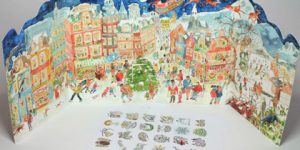 Our Augmented Reality Advent Calendar Review of the Year
Our Augmented Reality Advent Calendar Review of the Year
From 1 December through to Christmas Day, our augmented reality Advent calendar will be showcasing some of the top news and events of 2016. Each day someone from the University will be opening one of the doors to reveal a new piece of digital content. Read more about the calendar/
The calendar covers stories including some of the below:
January: In January 2016 Lakeside Arts celebrated the 80th anniversary of the iconic Nottingham-born beauty brand No 7. ‘Inspiring Beauty. No 7 – 80 years of making up the modern woman‘ was the most popular exhibition staged in the Weston Gallery. It showcased previously unseen material from the Boots Archives and Manuscripts and Collections. The exhibition attracted 8648 visitors.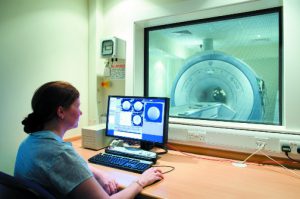
February: On what would have been her 10th birthday, researchers at the Children’s Brain Tumour Research Centre at The University of Nottingham gave their thanks to Claudia Burkill’s fundraising which has raised a staggering £250,000 to fund research into the disease that claimed her life. Claudia was just five years old when she was diagnosed with the incredibly rare and extremely aggressive Metastatic PineoBlastoma tumour in June 2011.
March: New scanning technology which will give a much clearer picture of lung disease has taken a major step forward thanks to scientists at The University of Nottingham. The experts at the Sir Peter Mansfield Imaging Centre have developed a process using specially treated krypton gas as an inhalable contrast agent to make the spaces inside the lungs show up on an Magnetic resonance imaging (MRI) scan. It’s hoped the new process will eventually allow doctors to virtually see inside the lungs of patients.
April: The story about an urban gym being created for portly squirrels was one of our biggest stories of the year. It was eventually unveiled as an April Fool. The University of Nottingham published the story on their website and social media feeds shortly after midnight on 1 April 2016. Shortly afterwards #Fatsquirrels was trending in Nottingham with social media users enjoying the images of the tubby rodents.
May: Accolades for academics who are changing our lives for the better. From smart wheels for aircraft to biological bandages to prevent blindness, academics from The University of Nottingham were recognised in May for their achievements in helping to solve some of the world’s pressing problems.
The University’s Knowledge Exchange and Impact Awards recognised the new ideas and technologies being developed in collaboration with industry and commerce and the work done in communicating science across all media platforms.
June: Vice-Chancellor Professor Sir David Greenaway reflected on six years of fundraising for Life Cycle as he prepared for his final ride – taking in the four geographical corners of the UK in a gruelling 1,400 bike ride to raise £1m for breast cancer research.
July: Nottingham Dollies prove cloned sheep can live long and healthy lives. In July Debbie, Denise, Dianna and Daisy, the four Nottingham Dollies, attracted the attention of the world’s media. Our research had shown that these four elderly ladies, derived from the same cell line — genomic copies of Dolly — reached their 8th birthdays in good health.
The research was published in Nature Communications just three weeks after the scientific world marked the 20th anniversary of the birth of Dolly the sheep.
August: The results for the 2016 National Student Survey (NSS) were our best to date.
We achieved our highest ever level of ‘overall satisfaction’ – 89% – against last year’s 86% and our previous high of 88% (in 2014).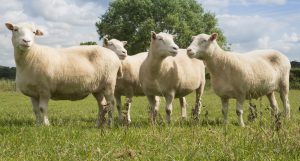
The corresponding score for question 22 was 4.29 – again the highest we’ve achieved and which also just exceeds the University’s Strategy 2020 target of 4.28.
Our average score across all questions was also our highest, at 4.16. This score across all questions places Nottingham at 9th within the Russell Group, as compared to 17th in the 2015 results (noting that reported rank within any group depends on which NSS measures are used).
We also maintained our very high response rate of 75%, reflecting our students’ strong engagement with providing us this important source of feedback and insight about their experience.
September: There were celebrations in September when the University of Nottingham was named best university in the UK for graduate employment, according to the 2017 The Times and The Sunday Times Good University Guide.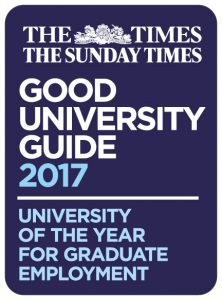 The University was also back in the top 20 of The Sunday Times Good University Guide after moving up five places, due mainly to a significant increase in student satisfaction.
The University was also back in the top 20 of The Sunday Times Good University Guide after moving up five places, due mainly to a significant increase in student satisfaction.
October: On October 25 Nottingham decamped to London to stage the very first, and hugely successful, Nottingham in Parliament Day.
The one-day takeover of Westminster involved more than 100 organisations from Nottingham and Nottinghamshire. After chairing an entertaining special edition of University Challenge, featuring teams from the House of Commons and the University of Nottingham, Speaker of the House John Bercow said: “Nottingham has shown itself to be a leader. And where you have led, others may now follow.”
November: A nationwide search to find a mate for a ‘one in a million’ rare mutant garden snail was over.
In October, Dr Angus Davison in The University of Nottingham’s School of Life Sciences appealed to the public for their help in match-making for Jeremy, who with a left-handed, anti-clockwise spiralling shell is a mirror image of other brown garden snails.
December: It is one of the biggest conundrums facing scientists – understanding why our universe is expanding. In December Dr Clare Burrage was able to start answering this question following a £800,000 Research Leadership Award from the Leverhulme Trust.
No comments yet, fill out a comment to be the first

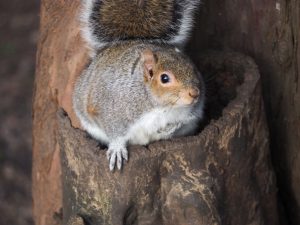
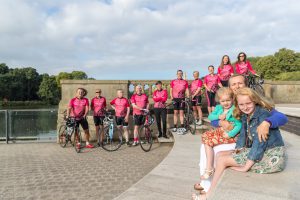
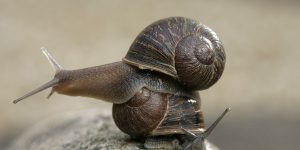
Leave a Reply